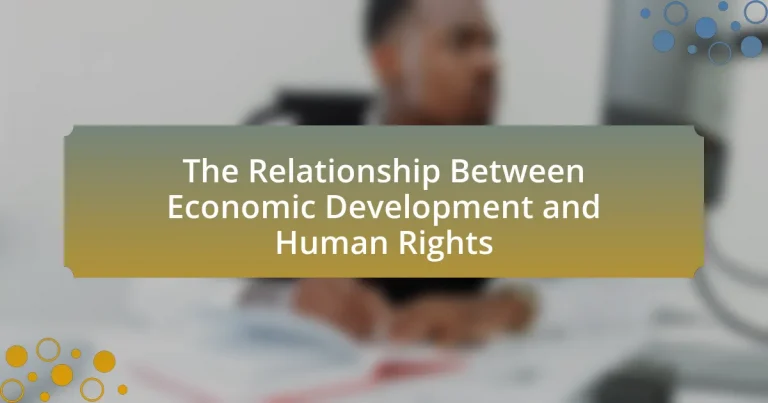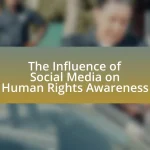The article examines the intricate relationship between economic development and human rights, highlighting how economic growth can enhance the realization of human rights while the protection of these rights fosters sustainable economic development. It discusses key principles of economic development, such as sustainability, equity, and inclusivity, and defines human rights in this context as essential entitlements that enable individuals to participate in economic processes. The article further explores the implications of this relationship for policy-making, social justice, and equity, emphasizing the importance of integrating human rights considerations into economic policies to achieve better social and economic outcomes. Additionally, it addresses the challenges faced by developing countries and the role of international aid in balancing economic growth with human rights protections.
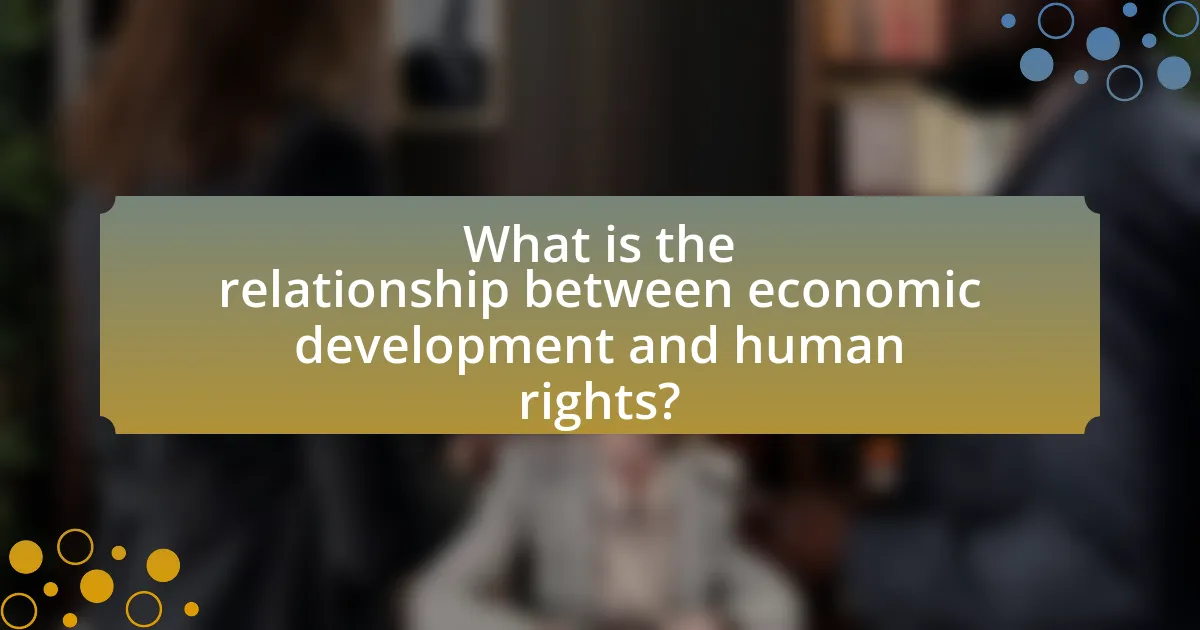
What is the relationship between economic development and human rights?
Economic development and human rights are interrelated, as economic growth can enhance the realization of human rights, while the protection of human rights can foster sustainable economic development. For instance, countries that prioritize human rights often experience better economic outcomes, as evidenced by the correlation between democratic governance and economic performance. According to the United Nations Development Programme, nations that respect civil liberties and political rights tend to have higher levels of human development, which includes access to education, healthcare, and economic opportunities. Furthermore, the World Bank has reported that inclusive economic policies that promote equality and protect workers’ rights contribute to more stable and prosperous economies. Thus, the relationship is reciprocal; economic development can support the advancement of human rights, and the safeguarding of human rights can create an environment conducive to economic growth.
How do economic development and human rights intersect?
Economic development and human rights intersect through the promotion of social and economic well-being, which is essential for the realization of fundamental human rights. Economic growth can enhance access to education, healthcare, and employment opportunities, thereby fostering an environment where human rights are respected and upheld. For instance, the United Nations Development Programme emphasizes that sustainable economic development contributes to the fulfillment of human rights by improving living standards and reducing poverty. Additionally, countries that prioritize human rights often experience more stable economic growth, as inclusive policies lead to greater social cohesion and trust in institutions.
What are the key principles of economic development?
The key principles of economic development include sustainable growth, equity, and inclusivity. Sustainable growth emphasizes the need for economic activities that do not deplete resources or harm the environment, ensuring long-term viability. Equity focuses on fair distribution of wealth and opportunities, aiming to reduce poverty and inequality. Inclusivity ensures that all segments of society, particularly marginalized groups, have access to economic opportunities and benefits. These principles are supported by evidence from various studies, such as the United Nations Development Programme’s Human Development Index, which highlights the correlation between economic development and improvements in health, education, and living standards.
How are human rights defined in the context of economic development?
Human rights in the context of economic development are defined as the fundamental entitlements that ensure individuals can participate fully in economic processes and benefit from economic growth. These rights include the right to work, the right to an adequate standard of living, and the right to social security, which are essential for fostering inclusive economic development. The United Nations’ Sustainable Development Goals emphasize that economic development should not only focus on growth metrics but also on the realization of human rights, highlighting that poverty alleviation and social equity are integral to sustainable economic progress.
Why is understanding this relationship important?
Understanding the relationship between economic development and human rights is important because it reveals how economic policies can directly impact the realization of human rights. Economic development can enhance living standards, access to education, and healthcare, which are essential for the fulfillment of human rights. For instance, the United Nations Development Programme (UNDP) emphasizes that economic growth can lead to improved social conditions, thereby promoting rights such as the right to health and education. Conversely, neglecting human rights in the pursuit of economic growth can lead to social unrest and inequality, as evidenced by the Arab Spring, where economic disparities fueled demands for political and social rights. Thus, comprehending this relationship is crucial for creating policies that foster both economic prosperity and the protection of human rights.
What implications does this relationship have for policy-making?
The relationship between economic development and human rights significantly influences policy-making by necessitating the integration of human rights considerations into economic policies. Policymakers must recognize that economic growth can enhance human rights, as evidenced by the United Nations Development Programme’s findings that countries with higher GDP per capita tend to have better human rights records. This relationship implies that policies promoting economic development should also prioritize human rights protections to ensure sustainable and equitable growth. For instance, the World Bank emphasizes that inclusive economic policies that address inequality can lead to improved social outcomes, reinforcing the need for a holistic approach in policy formulation.
How does this relationship affect social justice and equity?
The relationship between economic development and human rights significantly impacts social justice and equity by influencing access to resources and opportunities. Economic development can enhance social justice when it leads to improved living standards, education, and healthcare, thereby reducing inequalities. For instance, countries that prioritize human rights in their economic policies, such as those promoting fair labor practices and equitable resource distribution, often experience lower poverty rates and greater social cohesion. According to the United Nations Development Programme, nations that integrate human rights into their economic frameworks tend to achieve more sustainable development outcomes, which fosters equity among different social groups.
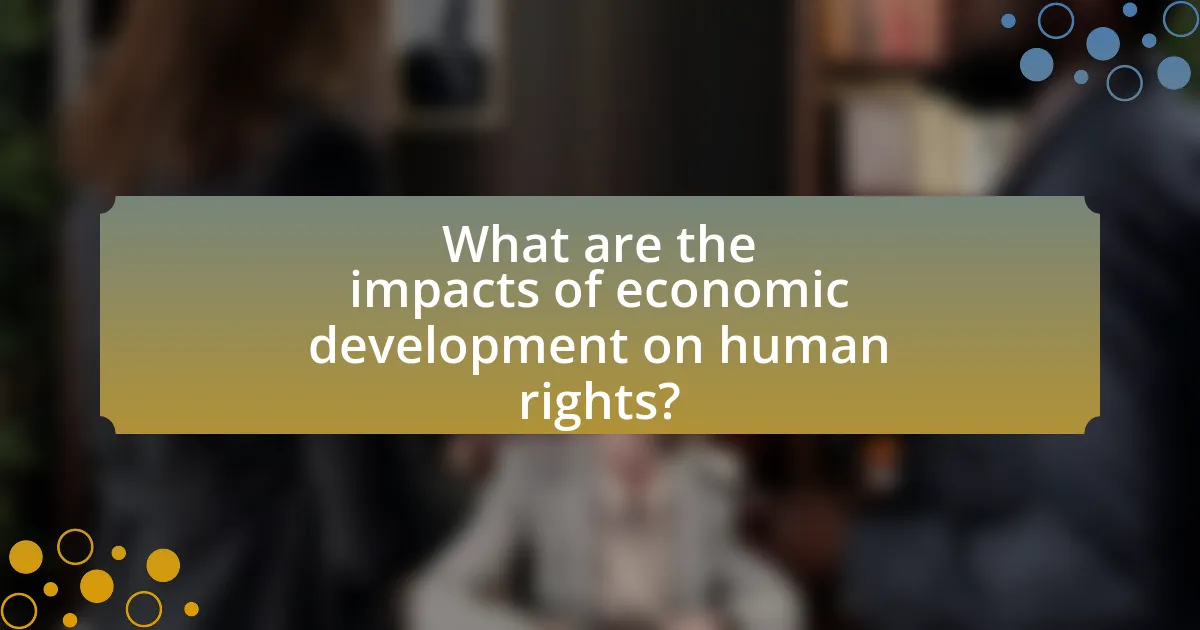
What are the impacts of economic development on human rights?
Economic development can significantly impact human rights, both positively and negatively. On the positive side, economic growth often leads to improved living standards, increased access to education, and better healthcare, which can enhance the realization of rights such as the right to health and education. For instance, countries like South Korea and Singapore have demonstrated that rapid economic development can correlate with advancements in civil and political rights as well as social rights.
Conversely, economic development can also lead to human rights violations, particularly when growth is prioritized over social equity. In some cases, rapid industrialization has resulted in displacement of communities, exploitation of labor, and environmental degradation, undermining the rights of affected populations. For example, in countries like China, economic expansion has been linked to significant restrictions on freedom of expression and assembly, as the government seeks to maintain stability amidst rapid change.
Overall, the relationship between economic development and human rights is complex, with outcomes varying based on governance, policy choices, and the inclusivity of the development process.
How can economic growth enhance human rights?
Economic growth can enhance human rights by increasing resources available for social services, education, and healthcare, which are essential for the realization of fundamental rights. When economies grow, governments often have more tax revenue, allowing them to invest in infrastructure and public services that improve living standards. For instance, according to the World Bank, countries that experience sustained economic growth tend to see improvements in health outcomes and educational attainment, which are critical components of human rights. Additionally, economic growth can lead to job creation, reducing poverty and enabling individuals to exercise their rights more fully. The United Nations Development Programme highlights that economic development is linked to greater political stability and the strengthening of democratic institutions, further promoting human rights.
What role does job creation play in promoting human rights?
Job creation plays a crucial role in promoting human rights by providing individuals with economic opportunities that enhance their dignity and autonomy. When jobs are created, they contribute to poverty alleviation, which is directly linked to the realization of various human rights, including the right to an adequate standard of living. For instance, according to the International Labour Organization, employment can reduce inequality and empower marginalized groups, thereby fostering social inclusion and respect for human rights. Furthermore, stable employment often leads to better access to education and healthcare, reinforcing the interconnectedness of economic development and the protection of human rights.
How does access to education contribute to human rights advancements?
Access to education significantly contributes to human rights advancements by empowering individuals with knowledge and skills necessary for informed decision-making and active participation in society. Education fosters critical thinking, enabling individuals to advocate for their rights and the rights of others, which is essential for the promotion of democratic values and social justice. For instance, UNESCO reports that each additional year of schooling can increase an individual’s income by up to 10%, which correlates with improved economic stability and reduced poverty, both of which are fundamental human rights. Furthermore, educated populations are more likely to engage in civic activities, leading to stronger governance and accountability, thereby enhancing the protection of human rights.
What negative consequences can arise from economic development?
Economic development can lead to negative consequences such as increased inequality, environmental degradation, and the erosion of cultural identities. Increased inequality often occurs as wealth generated from development disproportionately benefits certain groups, leaving marginalized communities behind; for instance, the World Bank reported that in many developing countries, the richest 10% earn significantly more than the poorest 10%. Environmental degradation arises from industrialization and urbanization, which can result in pollution and loss of biodiversity; a study by the United Nations Environment Programme highlighted that economic growth has often come at the cost of natural resources, leading to unsustainable practices. Additionally, the erosion of cultural identities can happen as globalization spreads dominant cultures, threatening local traditions and languages; UNESCO has documented numerous cases where indigenous cultures have been diminished due to economic pressures.
How can economic development lead to human rights violations?
Economic development can lead to human rights violations through mechanisms such as displacement, exploitation, and inequality. For instance, large-scale infrastructure projects often require land acquisition, which can forcibly displace communities, violating their rights to housing and livelihood. The World Bank has documented cases where development projects have led to the eviction of indigenous populations without adequate compensation or consultation, undermining their rights. Additionally, economic growth can result in labor exploitation, where workers face poor working conditions and inadequate wages, particularly in developing countries. Reports from organizations like Human Rights Watch highlight instances where economic incentives prioritize profit over the protection of workers’ rights. Furthermore, economic development can exacerbate social inequalities, marginalizing vulnerable groups and limiting their access to resources and opportunities, which can lead to systemic discrimination and violations of rights.
What are the risks of prioritizing economic growth over human rights?
Prioritizing economic growth over human rights poses significant risks, including the erosion of individual freedoms and the perpetuation of inequality. When governments focus primarily on economic metrics, they may implement policies that suppress dissent, limit freedom of expression, and violate civil liberties to maintain stability and attract investment. For instance, countries like China have experienced rapid economic growth while facing criticism for human rights abuses, such as the repression of ethnic minorities and censorship of free speech. Additionally, prioritizing economic growth can lead to environmental degradation, disproportionately affecting marginalized communities and exacerbating social inequalities. The United Nations Development Programme highlights that sustainable development must integrate human rights to ensure equitable growth that benefits all citizens, not just a privileged few.
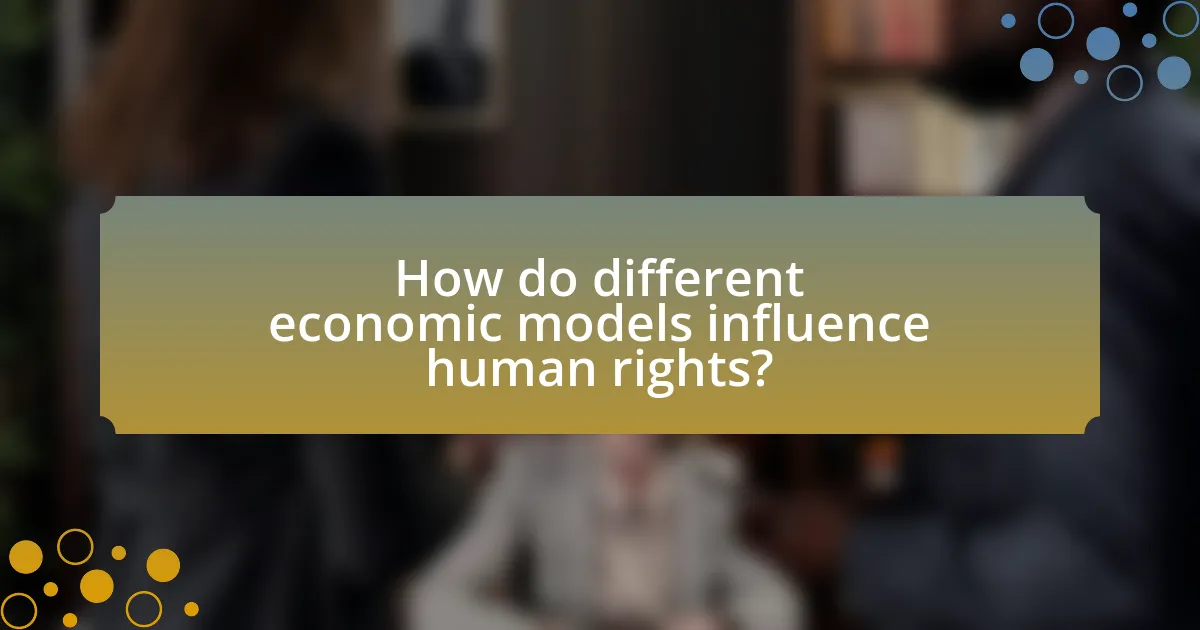
How do different economic models influence human rights?
Different economic models significantly influence human rights by shaping the distribution of resources, access to opportunities, and the protection of individual freedoms. For instance, capitalist economies often prioritize individual property rights and personal freedoms, which can enhance civil and political rights; however, they may also lead to economic inequalities that undermine social rights. In contrast, socialist models emphasize collective ownership and equitable resource distribution, which can promote social rights but may restrict individual freedoms and political rights, as seen in historical examples like the Soviet Union. Research by the United Nations Development Programme indicates that countries with mixed economies, which balance market mechanisms with social welfare policies, tend to achieve better human rights outcomes, as they can provide both economic growth and social protections.
What are the characteristics of inclusive economic models?
Inclusive economic models are characterized by equitable access to resources, opportunities, and benefits for all individuals, regardless of their socio-economic status. These models prioritize social equity, ensuring that marginalized groups, such as women, minorities, and the poor, have a voice in economic decision-making processes. Additionally, inclusive economic models emphasize sustainable development, integrating environmental considerations to promote long-term economic viability.
Evidence supporting these characteristics includes the United Nations’ Sustainable Development Goals, which advocate for reducing inequalities and promoting inclusive growth. Research by the World Bank indicates that inclusive economic growth can lead to higher overall economic performance, as it harnesses the potential of a broader segment of the population.
How do inclusive models promote human rights?
Inclusive models promote human rights by ensuring that all individuals, regardless of their background, have equal access to opportunities and resources. These models foster participation in decision-making processes, which enhances accountability and transparency in governance. For instance, countries that implement inclusive economic policies, such as those promoting gender equality and minority rights, often see improvements in social cohesion and reduced inequality. Research by the United Nations Development Programme indicates that inclusive economic growth leads to better human development outcomes, as it empowers marginalized groups and strengthens their rights.
What examples exist of successful inclusive economic development?
Successful examples of inclusive economic development include the Grameen Bank in Bangladesh and the Bolsa Família program in Brazil. The Grameen Bank, founded by Muhammad Yunus, provides microloans to impoverished individuals, particularly women, enabling them to start small businesses and improve their economic status. This initiative has lifted millions out of poverty, with over 9 million borrowers reported by 2021.
Similarly, Brazil’s Bolsa Família program offers financial aid to low-income families, conditional on children’s school attendance and health check-ups. This program has significantly reduced poverty rates, with a reported 28% decrease in extreme poverty from 2003 to 2013. Both examples demonstrate how targeted economic initiatives can foster inclusive growth and enhance human rights by improving living standards and access to opportunities.
What are the challenges faced by developing countries?
Developing countries face significant challenges including poverty, inadequate infrastructure, limited access to education, and health care deficiencies. For instance, according to the World Bank, over 700 million people live on less than $1.90 a day, highlighting extreme poverty as a critical issue. Additionally, many developing nations struggle with insufficient infrastructure, which hampers economic growth and access to essential services. The United Nations Educational, Scientific and Cultural Organization (UNESCO) reports that approximately 263 million children and youth are out of school, indicating a severe lack of educational opportunities. Health care systems in these countries are often underfunded and lack resources, leading to high rates of preventable diseases and mortality. These interconnected challenges hinder economic development and the realization of human rights, creating a cycle of disadvantage that is difficult to break.
How do resource constraints impact human rights in developing nations?
Resource constraints significantly undermine human rights in developing nations by limiting access to essential services such as healthcare, education, and clean water. These limitations often lead to increased poverty, malnutrition, and disease, which directly violate the right to health and well-being. For instance, according to the World Bank, over 700 million people live on less than $1.90 a day, which restricts their ability to secure basic human rights. Furthermore, inadequate funding for public services can result in systemic discrimination, where marginalized groups, including women and ethnic minorities, face greater barriers to accessing their rights. This cycle of deprivation perpetuates inequality and hinders overall economic development, reinforcing the link between resource availability and the realization of human rights.
What role does international aid play in balancing economic development and human rights?
International aid plays a crucial role in balancing economic development and human rights by providing resources and support that promote both objectives simultaneously. For instance, aid can fund education and healthcare initiatives, which enhance human rights while also contributing to a more skilled workforce that drives economic growth. According to the United Nations Development Programme, countries that receive targeted aid often see improvements in human development indices, which correlate with better economic performance. Furthermore, aid can incentivize governments to adopt policies that respect human rights, as funding is often contingent upon adherence to international human rights standards. This dual focus on economic and human rights development is essential for sustainable progress, as evidenced by the success of various aid programs in countries like Rwanda, where aid has facilitated both economic recovery and improvements in social justice.
What best practices can enhance the relationship between economic development and human rights?
Integrating human rights into economic development strategies enhances their relationship by ensuring that growth is inclusive and equitable. Best practices include implementing policies that prioritize social equity, such as fair labor standards and access to education, which have been shown to improve economic outcomes. For instance, the International Labour Organization reports that countries with strong labor rights experience higher productivity and economic growth. Additionally, fostering participatory governance allows communities to have a voice in development processes, leading to more sustainable and rights-respecting outcomes. Evidence from the United Nations Development Programme indicates that nations that incorporate human rights into their development frameworks achieve better social and economic indicators.
How can governments implement policies that support both economic growth and human rights?
Governments can implement policies that support both economic growth and human rights by integrating human rights standards into economic planning and development strategies. This approach ensures that economic initiatives do not compromise individual freedoms and social justice. For instance, countries like Sweden and Norway have successfully combined robust welfare systems with strong economic performance, demonstrating that investment in education, healthcare, and social security can lead to sustainable economic growth while upholding human rights. Additionally, enforcing labor rights and promoting fair wages can enhance productivity and consumer spending, further driving economic growth. Studies show that nations with higher human rights protections tend to experience more stable economic environments, attracting foreign investment and fostering innovation.
What role do NGOs play in promoting this relationship?
NGOs play a crucial role in promoting the relationship between economic development and human rights by advocating for policies that ensure economic growth is inclusive and equitable. They engage in research, raise awareness, and mobilize communities to highlight the importance of human rights in economic policies. For instance, NGOs like Human Rights Watch and Amnesty International document human rights abuses linked to economic activities, influencing public opinion and policy decisions. Their reports often provide evidence that economic development can lead to human rights violations, thereby pushing governments and corporations to adopt more responsible practices. This advocacy is essential for ensuring that economic development efforts do not come at the expense of fundamental human rights, thereby fostering a more just and sustainable economic environment.
